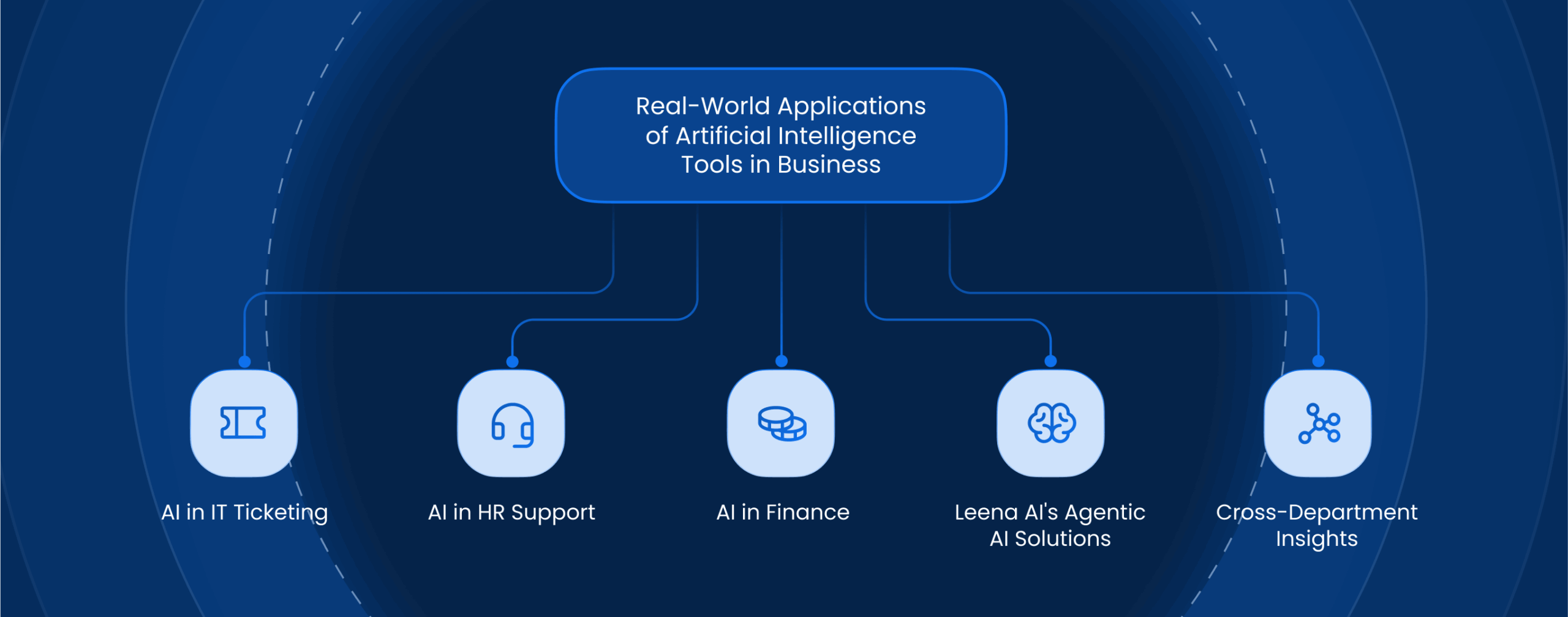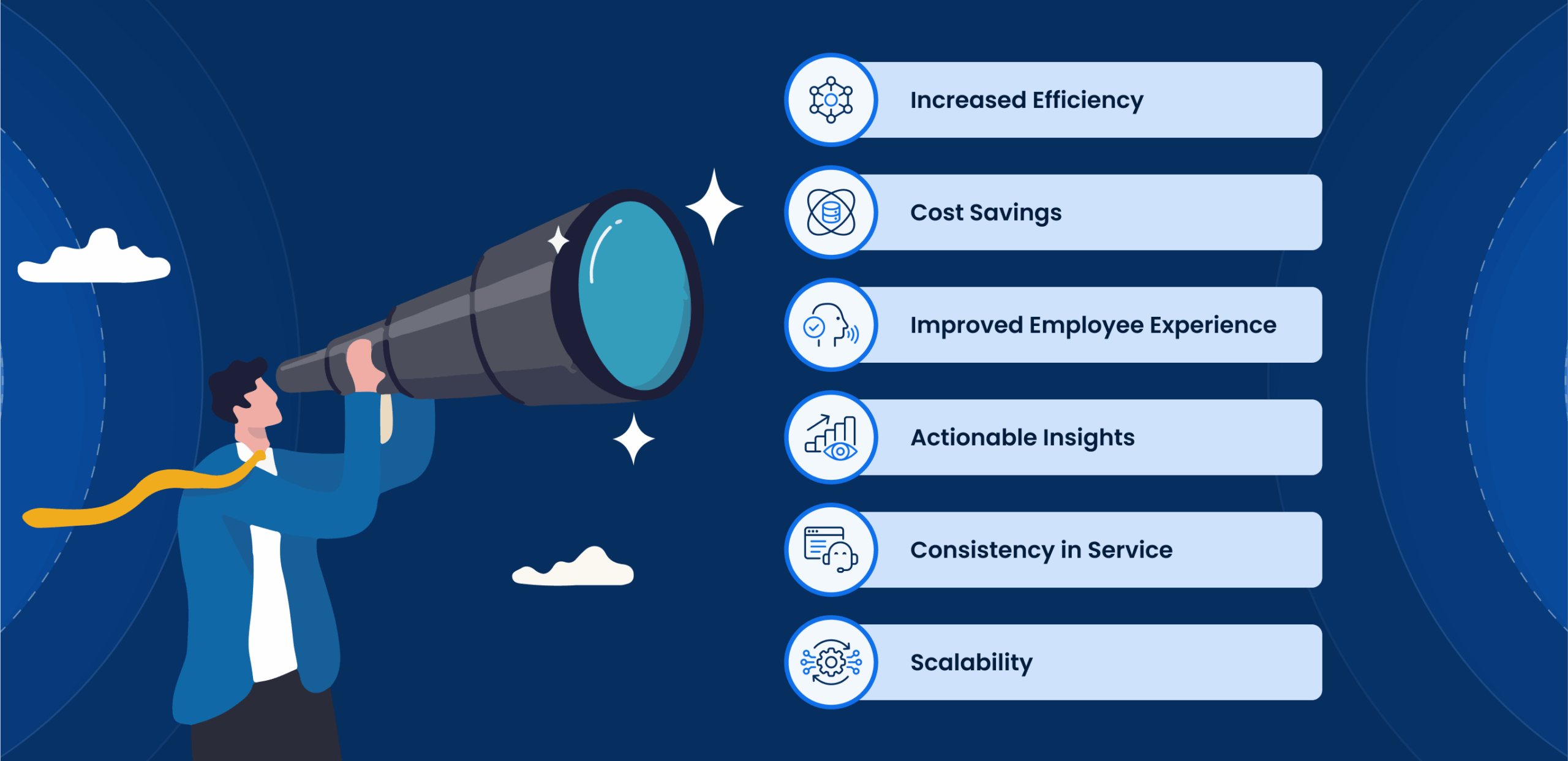Introduction
Artificial intelligence tools for business are redefining how enterprises handle daily operations, particularly in IT, HR, and Finance ticketing. For CIOs, CTOs, and technology heads, understanding these tools is key to boosting efficiency, improving employee experiences, and reducing operational costs while staying competitive in 2025.
Understanding Artificial Intelligence Tools for Business
Artificial intelligence tools for business help organizations automate repetitive tasks, provide instant support, and make data-driven decisions. Unlike traditional software, AI tools learn from interactions, improving accuracy and speed over time. For example, an AI agent can handle employee requests for password resets, expense approvals, or software provisioning without human intervention, freeing teams to focus on strategic work.
- AI tools streamline ticket management, reduce resolution times, and enhance overall service quality.
- They provide insights into recurring issues, helping teams prevent problems before they escalate.
- These tools adapt to the unique workflows of each department, learning from employee behavior to provide increasingly personalized support.
- By consolidating information from multiple systems, AI tools reduce manual lookups, errors, and redundancies.
Core Technologies Behind Artificial Intelligence Tools
-
Machine Learning: Recognizes patterns, predicts outcomes, and continuously improves task execution, enabling automatic categorization of tickets and intelligent routing.
-
Natural Language Processing: Allows AI to understand and respond to employee queries in conversational language across chat, email, and voice channels.
-
Automation: Executes repetitive, rule-based tasks without human input, handling complex workflows in IT, HR, and Finance seamlessly.
-
Predictive Analytics: Uses historical data to forecast issues before they arise, helping leaders proactively allocate resources.
-
Cognitive Computing: Simulates human thought processes to assist in problem-solving and decision-making for more complex ticketing scenarios.
Benefits of Implementing Artificial Intelligence Tools in Business
- Increased Efficiency: AI agents resolve high volumes of tickets simultaneously, reducing wait times and preventing backlog.
- Cost Savings: Automating repetitive tasks decreases operational costs and frees employees to focus on higher-value initiatives.
- Improved Employee Experience: Employees receive fast, accurate responses, improving engagement and satisfaction across departments.
- Actionable Insights: AI tools generate analytics on ticket trends, common requests, and performance metrics, enabling strategic decision-making.
- Consistency in Service: AI tools ensure uniform responses to common requests, reducing variability caused by human agents.
- Scalability: Enterprises can handle growth and fluctuating ticket volumes without proportional increases in staff.
Overcoming Challenges in Adopting Artificial Intelligence Tools
- Data Quality: Accurate, structured data is essential for AI performance. Leaders must ensure proper data governance and standardization.
- Integration Complexity: Choose AI tools that integrate smoothly with existing enterprise systems like HR management, IT service management, and finance platforms.
- Employee Adoption: Encourage adoption through training, clear communication, and showcasing tangible benefits to employees.
- Change Management: Establish a phased implementation approach to reduce disruption and gain buy-in across departments.
- Security and Compliance: AI tools must comply with industry regulations and enterprise data security standards to protect sensitive information.
Building an Effective Artificial Intelligence Strategy with Artificial Intelligence Tools
- Identify Key Processes: Determine which repetitive and high-volume tasks in IT, HR, and Finance will benefit most from AI.
- Choose the Right Tools: Evaluate solutions based on scalability, ease of integration, and alignment with enterprise workflows.
- Implement Gradually: Begin with high-volume, low-risk processes and expand as the AI system learns and improves.
- Monitor and Optimize: Continuously track AI performance, gather feedback, and refine models for sustained efficiency.
- Set Clear Metrics: Define KPIs such as ticket resolution time, employee satisfaction, and cost savings to measure AI impact.
- Foster Collaboration: Involve IT, HR, and Finance teams in the AI strategy to ensure the system meets real-world needs.
Real-World Applications of Artificial Intelligence Tools in Business
- AI in IT Ticketing: Handle password resets, system access requests, software troubleshooting, and incident escalation automatically, reducing downtime.
- AI in HR Support: Streamline leave approvals, payroll queries, onboarding requests, benefits administration, and employee surveys efficiently.
- AI in Finance: Manage invoice processing, expense approvals, compliance reporting, and budget tracking with speed and accuracy.
- Leena AI’s Agentic AI Solutions: Leena AI handles complex, multi-step tasks across IT, HR, and Finance. By understanding user intent and executing actions autonomously, it reduces human intervention, improves accuracy, and speeds up resolution. Enterprises gain measurable benefits in efficiency, employee satisfaction, and operational insight.
- Cross-Department Insights: AI tools consolidate data across IT, HR, and Finance to provide leaders with a unified view of operational trends and potential areas for improvement.

The Future of Artificial Intelligence Tools in Business
- AI will become increasingly autonomous, capable of handling complex tasks and making real-time decisions.
- Integration with enterprise systems will be seamless, with AI anticipating employee needs before requests are submitted.
- Advanced analytics and predictive modeling will allow leaders to prevent issues, allocate resources efficiently, and make informed strategic decisions.
- Early adoption of AI tools will give enterprises a competitive advantage through higher operational efficiency, improved employee satisfaction, and smarter decision-making.
How Leena AI Empowers Businesses with AI Tools
-
Leena AI combines agentic intelligence with deep enterprise integration to automate ticketing workflows.
-
The platform monitors performance, resolves issues proactively, and generates actionable insights for IT, HR, and Finance teams.
-
Enterprises can resolve tickets faster, enhance employee experiences, and make data-driven decisions with minimal manual intervention.
-
Leena AI’s agentic AI capabilities enable enterprises to handle multi-step workflows autonomously, reducing operational bottlenecks and providing measurable ROI.
Frequently Asked Questions
1.What are artificial intelligence tools for business?
AI tools automate tasks, provide support, and analyze data to improve enterprise operations across departments.
2. How do AI tools improve IT ticketing?
They automatically categorize, route, and resolve tickets, reducing response times and freeing human agents for complex issues.
3. Can AI tools handle HR requests?
Yes, AI agents efficiently manage leave approvals, payroll queries, onboarding, and benefits administration.
4. What is agentic AI?
Agentic AI performs multi-step tasks autonomously, understanding intent and executing actions without constant human oversight.
5. How do AI tools save costs for enterprises?
By automating repetitive tasks, reducing manual errors, and optimizing workflows across IT, HR, and Finance.
6. Are AI tools difficult to integrate with existing systems?
Modern AI tools are designed for seamless integration with enterprise platforms, minimizing disruption.
7. What is the future of AI tools in business?
AI will become more autonomous, predictive, and integrated, enabling smarter decisions, higher efficiency, and improved employee experiences.
8. How does Leena AI enhance employee experience?
By providing instant support and resolving requests quickly, employees spend less time waiting for answers and more time on productive tasks.
9. What makes AI tools scalable?
AI tools can handle growing ticket volumes without a proportional increase in staff, adapting to enterprise needs as they expand.














